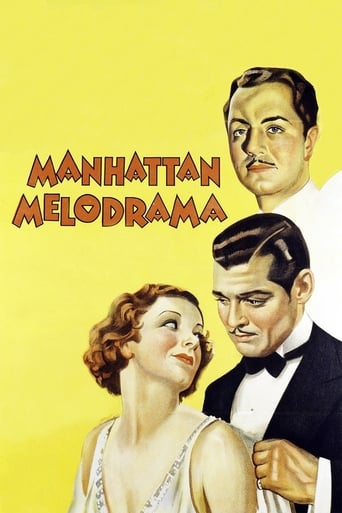atlasmb
Myrna Loy, who was often paired with William Powell or Clark Gable, is paired with both in "Manhattan Melodrama". Gable plays Blackie--a gangster/casino owner with a sense of honor. Powell plays Jim--a childhood friend of Blackie, who, due to shared tragedies, becomes his spiritual brother, but finds success as a D.A. and politician.The film covers a lot of ground and the early scenes move at breakneck speed to bring the story to the adult lives of the main characters. Even then, the film feels like a condensed version of a film with more depth. Loy, as the love interest, holds her own and Powell is solid as the dutiful public servant, but Gable steals the show with his nuanced performance as anti-hero.The coincidences in this story stack up into a nifty pile of improbabilities, but it's a simple story at heart. Two "brothers" grow up on opposite sides of the law, but they still feel devotion to each other. Really, this is a love story. The most melodramatic parts are at the end of the film, when inescapable consequences allow for demonstrations of profound love.
mark.waltz
One of the most famous of early hamster films, not only for its all- star cast, but for its relation to the death of brutal gangster John Dillinger. Clark Gable may be the gangster here, but Dillinger apparently went to see this because of his affection for its leading lady, Myrna Loy. She's Gable's old girlfriend who ends up choosing to become the wife of his old pal, William Powell, who is a candidate for governor. It's a common story among gangster movies, boys gone both bad and good, and one's sadness at seeing the state of the others life. Gable was the headliner, the biggest male star of the time, and went home with the Oscar (for "It Happened One Night"), while Powell and Loy went onto become one of the great screen teams of all time. The three are awesome together, and it's easy to see why this is considered one of the all time classic dramas.There are elements of racism, sexism (towards men and women) and a few shocking elements of pre-code Hollywood that made that era so much fun. The Rodgers and Hart song, "Blue Moon", is heard here in another version, a song about how all men are bad and only out to break a woman's heart. Thanks for that memory, Shirley Ross. Nat Pendleton is the typical dumb, brutal thug, and Mickey Rooney plays Gable as a kid. In spite of a few eye rolling moments, though, it's practically perfect. Manhattan may continue to face melodrama more than 80 years later, but it was never done with such elegance as this is, through the eyes and camera lens of the fast moving W.S. Van Dyke.
kenjha
Two boyhood friends end up being on opposite sides of the law as adults. At least the film can't be accused of false advertising. This is definitely melodrama, which can be fun if done right; here, however, it starts off as merely uninteresting and ends up as being rather corny. Unfortunately, the star power of Gable, Powell, and Loy can't overcome the lackluster script. The film is mainly of interest for historical reasons. It was the first teaming of Powell and Loy, made just before "The Thin Man," also directed by Van Dyke. More notoriously, this was the film Dillinger went to see at the Biograph Theater in Chicago and was killed by the FBI upon emerging from the theater.
ackstasis
From what I can gather, two main social factors led to the popularity of the gangster genre in the 1930s. The first, and most obvious, was the prevalence of criminals like Al Capone and John Dillinger, who were glorified by the national media. The second was the Great Depression, and how it impacted the traditional notion of the "American dream." Families – regardless of character or social standing – were torn apart amid the economic collapse, and no doubt many ordinary citizens contemplated crime as the route to happiness.Films like 'Manhattan Melodrama (1934)' and 'Angels with Dirty Faces (1938)' place great emphasis on the thin line between "good" and "bad" characters, and often the central criminals are lamented as victims of circumstance. For example, James Cagney's Rocky Sullivan and Pat O'Brien's virtuous priest were separated by a matter of metres when the former is condemned to a life of crime. Circumstance, too, drives the fates of the characters in 'Manhattan Melodrama.' As children, both Jim Wade (William Powell) and Blackie Gallagher (Clark Gable) lose their parents in the burning of the steamship SS General Slocum, a true-life disaster caused by gross negligence that cost over 1000 lives. Each child responds to this injustice in their own way: Blackie rebels against the judicial system that betrayed him, whereas Jim enters law in a bid to reform it.Whereas Warner Bros. was responsible for most of the decade's gangster films, 'Manhattan Melodrama' was produced by M-G-M, and helmed by W.S. Van Dyke (director of the first four 'Thin Man' films), whose decidedly non-gritty aesthetic style at first seems at odds with the required mood. However, it would be misleading to compare the film with the likes of 'Little Caesar (1931)' and 'Scarface (1932).' Firstly, Hollywood was now working, for the first time, under the active supervision of the Production Code Administration. Also, the studio's intentions for the film were undoubtedly geared towards a higher-brow audience, further suggested by the unintimidating, woman-friendly title.Gable's "Blackie" Gallagher is not a paranoid hot-head like Tony Camonte or Rocky Sullivan, and, indeed, remains oddly passive throughout the film. When he does commit murders, it seems to be merely out of an obligation to genre conventions. Even when old friend Jim Wade dramatically demands his execution, Blackie looks on with a detached, amused smirk, doodling idly from the defendant's chair; the expected outburst of emotion never arrives. Instead, the story's central conflict unfolds entirely within the righteous Wade, who must choose between his personal and professional allegiances.'Manhattan Melodrama' has achieved some notoriety for being the film that killed John Dillinger, so to speak. The fugitive bank-robber was gunned down by FBI agents as he emerged from a screening at Chicago's Biograph Theatre on July 22, 1934 (clips from the film were recently featured in Michael Mann's 'Public Enemies (2009)'). These curious circumstances can't help but make one ponder what Dillinger had thought of 'Manhattan Melodrama.' Had he, like Blackie, accepted that his time was coming to an end? Did he welcome death over a lifetime of legal persecution? At the very least, he checked out having experienced a very fine addition to the genre.




